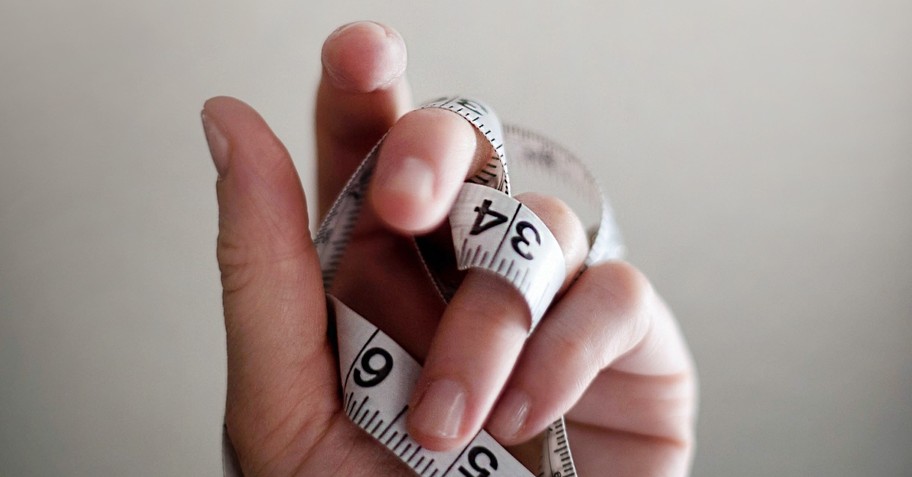Does God Care What You Weigh?

Our lives and how we live matter to God. In describing the practicalities of life in the Sermon on the Mount, Jesus explains, “Therefore I tell you, do not be anxious about your life, what you will eat or what you will drink, nor about your body, what you will put on. Is not life more than food, and the body more than clothing? Look at the birds of the air: they neither sow nor reap nor gather into barns, and yet your heavenly Father feeds them. Are you not of more value than they?” (Matt. 6:25-26).
If our lives matter to God, does God care about our weight? I believe that God does care about our weight, but not in the same way or for the same reason that we probably do. With any question regarding one’s self-perception of value, worth, or identity, it is critical to start with the foundational truth of God and His love for us as unconditional before evaluating specific conditions. God loves us as His beloved children, wanting us to be like Him in both glory and love (1 John 3:2) toward Him and toward one another (Matt. 22:37-39). Any question of identity, worth, or value must begin with the truth of God’s love for us, demonstrated through our being made in His image (Gen. 1:27), redeemed through the death and resurrection of Jesus (1 Peter 1:3-9), and intended for relationship and glorification through Christ (Rom. 8:30).
Photo Credit: © Getty Images/Tero Vesalainen
What Does the Bible Say about Our Bodies and Health?
In describing the person as made in the image of God, the Bible does not prioritize spirituality or spiritual health from our bodies and our physical health because Scripture defines the person as holistic or whole in body, soul, and spirit, inseparable. The attempt to distinguish spirituality from physical reality, promoting the spirit or soul as good and the physical body or flesh as bad is the ancient heresy of Gnosticism, creeping into the church within the first century and negated by John in his epistles (Jn. 1:14; 20:27). Being made in the image of God means that all aspects of the self, from the emotional to the nutritional to the psychological to the spiritual, matter to God because they are intricately connected with one another and influence, for good or for bad, all the other parts.
Paul uses the parts of the body in his analogy of the church, describing all the parts as performing essential yet different functions for the necessity of health and operation (1 Cor. 12: 12). Jesus is described in Luke 2:52 as “increas[ing] in wisdom and in stature and in favor with God and man,” showing the cooperative maturation of mind and body with social and spiritual relationships. Our bodies and health matter to God because it is with our bodies that we demonstrate His love to the world in Word and action (Mt. 25:31-46). Jesus demonstrated the importance of the body from His virgin birth through His resurrection, taking on this same body (Rom. 8:3; Phil. 2:7), addressing the needs of the body in direct connection and in demonstration of His power to forgive sins (Matt. 9:2-8), and in retaining a real but glorified body in His resurrection (Jn. 20:27). The body matters to God, He made it and took on flesh, retaining human flesh in His bodily resurrection (Luke 24:39). The holistic connection between all these elements means, however, that each component affects the others for both good and for bad. This is why I believe God does care about our weight, because our ability to freely exercise the range of capabilities within each component is dependent on the disciplines we apply to strengthen each resource.
As Donald Whitney explained in Spiritual Disciplines for the Christian Life,
“The Spiritual Disciplines are God-given means we are to use in the Spirit-filled pursuit of Godliness… We recognize that even the most iron-willed self-discipline will not make us more holy, for growth in holiness is a gift from God. On the other hand, we can do something to further the process. God has given us the Spiritual Disciplines as a means of receiving His grace and growing in Godliness. By them we place ourselves before God for Him to work in us” (pp. 18-19).
The spiritual disciplines of prayer, Bible reading, fasting, or service are dependent on our physical capacities as well, demonstrating the connection across each component and how freedom comes through discipline. Freedom to run and play with children comes through discipline in our nutrition for energy, our work for time, our thinking for margin, and our body for capability. In connecting our food intake with our spiritual life, Paul recommends restraint and discipline, pushing against the Corinthians' use of freedom in their expression, “All things are lawful,” but noting how "'All things are lawful,’ but not all things are helpful. ‘All things are lawful,’ but not all things build up. Let no one seek his own good, but the good of his neighbor… So, whether you eat or drink, or whatever you do, do all to the glory of God” (1 Cor. 10:23-24; 31). Paul is reiterating the intention of Jesus from Matthew 6, directing our attention from ourselves and the basis of our needs and desires to God’s kingdom purposes in loving Him and others well.

Does God Care about My Weight?
God cares about our devotions, desires, and disciplines, which direct our attention and anxieties. Our weight, concerns about our weight, or the value that others attach to us because of our weight can replace the truth of what God defines as our value and identity as being loved by Him. For good or for bad, weight can become our god, an idol to which we sacrifice time and attention, allowing our weight or the pursuit of some ideal to define our worth and steal our devotion - replacing our dependence on God for our value and identity. The balance to a complete complacence about our bodies and health is the recognition of the connection across the holistic components of body, soul, and spirit and their dependence in discipline upon one another. God does not have a holy scale in heaven by which he is gauging our waistline as a measure of love, acceptance, gifting, and usefulness.
While our contemporary weight worries tend toward a concern with excess weight and much of human history worried about the scarcity of food and other resources, the desire for redirecting our attention and priority to the kingdom of God and His righteousness remains the same, with the reality of our physical concerns following through His provision and care (Matt. 6:33). Disciplines are interdependent but require prioritization in focus and intention, directing the disciplines of our body and mind to serve the spirit (1 Tim. 4:8).
Does God care about our weight? Yes, I believe that He does because He cares about us and the practicalities of our lives, but His greater concern is if our perception of our weight, or any identity, desire, or distraction, replaces His view of us. Our identity, value, and worth are defined as people loved by God (Rom. 5:8; 1 John 3:2), demonstrated through our alignment with His values, desires, and priorities (Ps. 37:4; Matt. 6:33). God desires our whole self to love Him and love others completely as our primary identity and priority.
Related Resource: Listen to our FREE podcast, Reframed: The Power of Perspective. In each episode, Carley provides practical techniques for identifying and reframing negative thinking patterns. Listen to an episode below, and check out all of our episodes on LifeAudio.com.
Photo Credit: Pexels/Ismael Sanchez
How to View My Weight and Health Through God's Eyes
I am so grateful for the accessibility and practicality of the Gospel. In addressing the impediments to aligning our desires and devotions to God’s kingdom, Jesus speaks to the practical concerns of his audience in the first century. In the Sermon on the Mount (Matt. 5-8), Jesus explains what it means to be His follower, providing comparisons and analogies to demonstrate the transformational nature of being born again from the Spirit into new life (John 3:5-6).
While many of the examples around the expectations of the law, murder, forgiveness, adultery, divorce, unrest, giving, prayer, fasting, money, anxiety, and judgment remain highly relevant to our culture today, the capacity for self-reliance in excess within our society has flipped the concern around, from a fear of scarcity and lack to the need for restraint and contentment. The underlying message remains the same – on whom do we depend for our provision of value, identity, worth, and sustenance? From an emphasis on exercise and dieting to maintain or gain a certain weight to embarrassment or shame regarding our self-image, an emphasis on weight is a distraction from the need to center our attention and desires on God and the purposes and values of His kingdom. “Seek first the kingdom of God and His righteousness” (Matt. 6:33). God cares about our needs, is aware of them, and will provide for them because He loves us (Matt. 6:25-31). Disciplined living across all aspects of life is necessary, supporting our freedom to love God and love others well through the disciplined exercise of body and mind as well (1 Thess. 5:6-11).
Viewing our weight and health through God’s eyes requires seeing ourselves the way that God sees us – loved. Our identity, value, and worth are defined in being created in the image of God and redeemed through the blood of Christ, confirmed in His resurrection. When I struggle to love myself it means that my priorities have shifted and I need to realign them to God’s kingdom priorities, loving God first with my whole heart, soul, and mind so that I can then love my neighbor as myself (Matt. 22:37-39). It takes the alignment of all of me to love God and love others. This love is activated and experienced through community. Jesus said that if we love Him, we will keep His commandments (John 14:15), which is abiding in His love, allowing that love to define our identity and reality, and then exhibiting that same love outward toward others (John 14:21; 15:12). God’s view is a view of sacrificial, everlasting love that is compassionate to the struggle and suffering of the body, calling us to dependence on Him in all things.

In Conclusion
Does God care about my weight? God cares about what I care about and sent His Son to redeem me and direct my affections (1 John 4:9-10). The real issue is not size or shape, but our stewardship of identity, value, discipline, desire, and direction. Jesus defined the greatest commandment as loving God with all our heart, with all our soul, with all our mind, and with all our strength (Mark 12:30). Loving God this way involves every part of us and requires alignment of these parts to the same purpose and direction. There is no room to hate your body or your weight but love God who gave you this body to love Him and love others. Loving or loathing any object as a priority over loving God is an idol and must be brought into submission and alignment to loving God and others.
To love God with our whole self means that we must also discipline ourselves and strengthen our capacity to freely love. Disciplining our time, nutrition, sleep, energy, leisure, and relationships is necessary to provide the margin to love God and to love others. God will not be weighing us according to pounds or waistline but by whether we loved Him and loved others well in feeding the hungry, hydrating the thirsty, welcoming the stranger, clothing the naked, visiting the sick and imprisoned (Matt. 25:31-46). Align your focus and desires with those of Jesus and you will find freedom in “disciplin[ing] yourself for Godliness” (1 Tim. 4:7) because His “yoke is easy and [His] burden is light” (Matt. 11:30).
Photo Credit: © Unsplash/Jennifer Burk
Originally published July 23, 2021.





